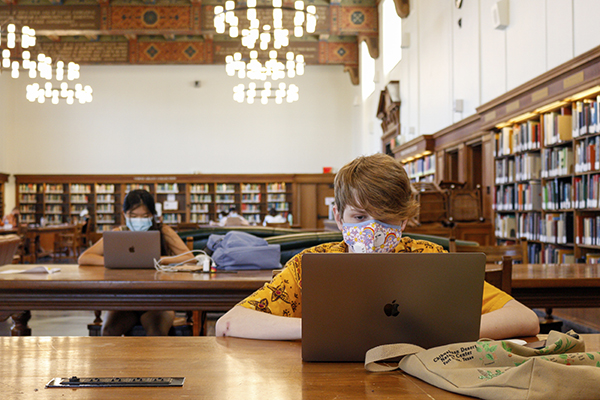The U.S. News and World Report ranked UT’s First-Year Experience program 25 in the nation and second in universities with over 30,000 students, but the program continues to make adjustments for COVID-19.
UT’s First-Year Experience, a program to ease the transition for first-year students, serves as a model in undergraduate education across the country, said Patty Moran Micks, First-Year Experience Office director. Micks works with colleges and universities across the country to help other institutions of higher education adopt a signature course program that fits their needs.
“My favorite part of the FYE Office at UT-Austin is the mixture of outstanding programs that serve the whole student, and that we are able to serve the entire UT campus with these programs,” Micks said. “We work in collaboration with all the schools and colleges at UT-Austin to administer cutting-edge courses and opportunities for new students at UT-Austin.”
Micks said part of the First-Year Experience are Signature Courses, which are taught by tenured and tenure-track professors, allowing first-year students to interact with top faculty in each department.
“Most classes taken in the first-year are large lectures that are not always taught by the top faculty in each department,” Micks said. “Having students interact early with distinguished faculty members really has turned the core curriculum on its head.”
The First-Year Experience also includes programs such as First-Year Interest Groups, which are groups of 18 to 25 first-year students who share classes during their first semester, led by an older student who shares resources with their mentees.
Jake Woods, a public health and Iberian and Latin American languages and cultures sophomore, became a FIG mentor after participating in the program his freshman year. Woods then realized a good mentor could help determine a freshman’s FIG experience.
“I really love that I can make it something special for another group of students,” Woods said.
Woods said he spent many hours on the Canvas page fitting the curriculum to an online format. Woods said the online format makes it harder for students to build bonds.
“We still cover the same material, but you missed the important part of the social interaction,” Woods said.
Despite the online format, geology freshman Liz Collins said she finds her FIG helpful for socializing and academics.
“I hang out with the kids in my FIG outside of my FIG, just because we're taking so many classes together,” Collins said.
Editor's note: This story has been corrected to reflect the correct spelling of the name of Patty Moran Micks.





















